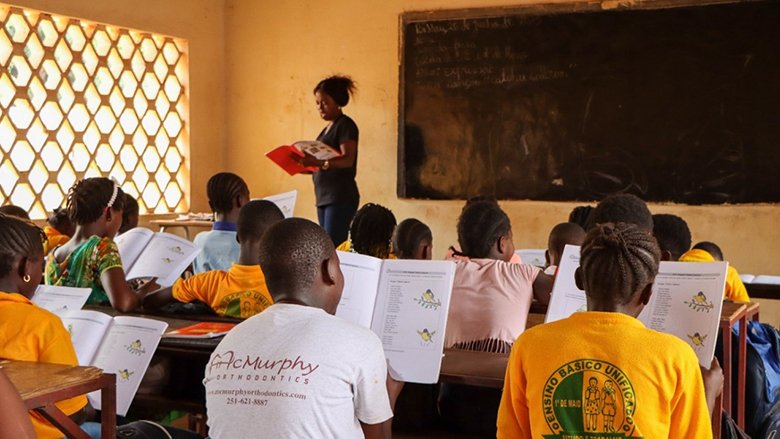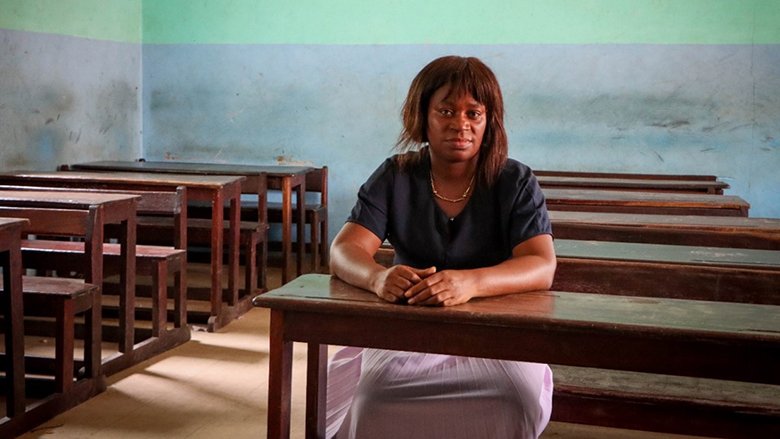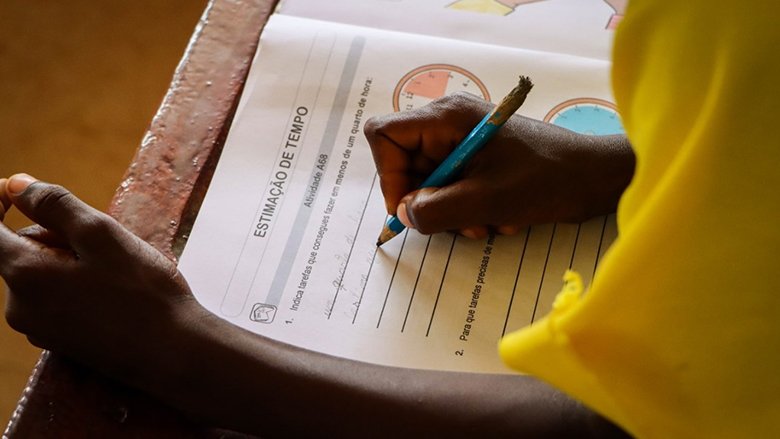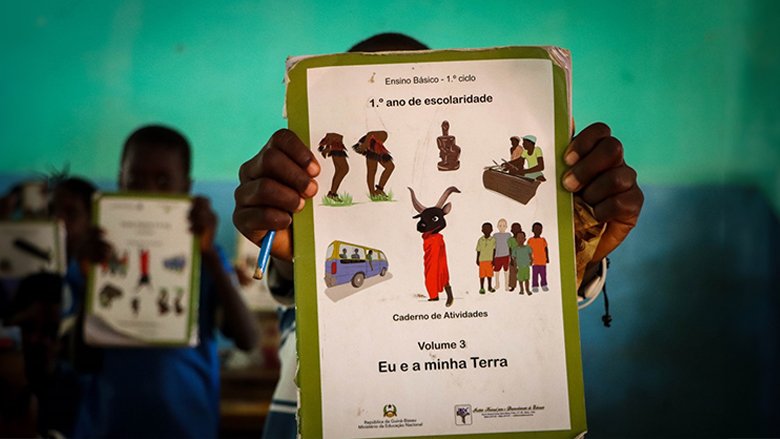In Guinea-Bissau, over 90% of the resources of the Ministry of Education are allocated to teachers’ salaries, leaving schools with insufficient basic resources. To fill this gap, the World Bank, through the Quality Education for All project, is supporting a curricular reform and the production of school manuals and teachers’ guides for primary schools, tested in 10 pilot schools, to be distributed to 560 schools later.

Teacher Maria Isabel Nhoque uses the new textbooks with her students in Bissau.
© Joana Rodrigues / World Bank
STORY HIGHLIGHTS
- Sustainable development in Guinea-Bissau relies on the quality of its education, but challenges abound.
- The Quality Education for All project supports the Ministry of Education and school management in implementing the Teacher Career Law. It brought down the number of teachers’ strikes that resulted in the loss of school years in Guinea-Bissau.
- As part of the project, a new school curriculum and new textbooks are being tested in pilot schools before being deployed all over the country.
We used to work with very old and outdated textbooks, and the students didn’t have any school materials, like manuals.
Rabiato Djaló, who works in Seco Wally primary school in Bula, a small village in the center of Guinea-Bissau, notes the textbooks are especially helpful for teaching Portuguese, the country’s official language. As Guinea-Bissau creole and local dialects are widely spoken, children start primary school in Portuguese, a language they do not speak at home – which inevitably compromises their learning.
“With these new textbooks, it’s much easier for us teachers to prepare the classes and it’s also much easier for the students to learn,” she says.
The 1980’s were the last time a new school curriculum had been implemented in Guinea-Bissau. The reform goes beyond new textbooks and is designed to strengthen school management and support human resources in schools and at a central level.
Aladje Fati, sub-director of the 1.º de Maio school, notes the positive impact of these changes on student grades and engagement in classes: “We had no didactic materials before, and when a teacher does not have any materials to work with is very difficult to teach. We can already see improvements in the students grades and in their engagement in classes.”
What is undermining education in Guinea-Bissau?
After decades of political instability, Guinea-Bissau remains a fragile state and one of the world’s poorest countries. This context affects the education sector on many levels: low financing; institutional instability; late entries into school, which affect girls particularly due to early marriages and pregnancies; lack of resources in schools; lack of school inspections; poor quality of the primary education and of the teaching force. Widespread and frequent teachers’ strikes contribute to exacerbating the situation.
The Quality Education for All project is part of the World Bank’s ongoing efforts to support the country’s development objectives. Delivering basic education services reliably and effectively is imperative for Guinea-Bissau to achieve sustainable, and inclusive development.
The project supports the Ministry of Education in creating model primary schools in five regions, which will be expanded to all regions.
Improvements in the education sector start with fewer teachers’ strikes.
Strikes regularly affected the education sector in Guinea-Bissau, as teachers complain about delays in salary payments and the delayed implementation of the 2018 Teacher Career Law, which encompasses a series of improvements that have yet to materialize. The frequent strikes negatively impact students’ learning outcomes and result in the loss of school years.
Addressing strikes is pivotal to improving education. Aware of this challenge, the World Bank supports the government’s reforms implementation. The appointment of 48 Human Resources Officers has improved communication between the Ministry of Education and teachers on the ground, which was hindered by the poor quality of the country’s roads and transports and the limited Internet access.
Several schools also reported cases of teachers receiving salaries while being absent from classes. Thanks to technology provided to schools and a staff survey, the schools’ human resources departments now have better control over teachers’ work, which has improved accountability and has significantly reduced unjustified absences. The project also supports school inspectors with training and assets, such as motorcycles to facilitate travelling between schools, and tablets to improve inspection records, which were done manually.
The project is expected to benefit over 73,000 primary school students, training 4,000 primary school teachers as well as school directors, inspectors, and other school staff by 2024.



